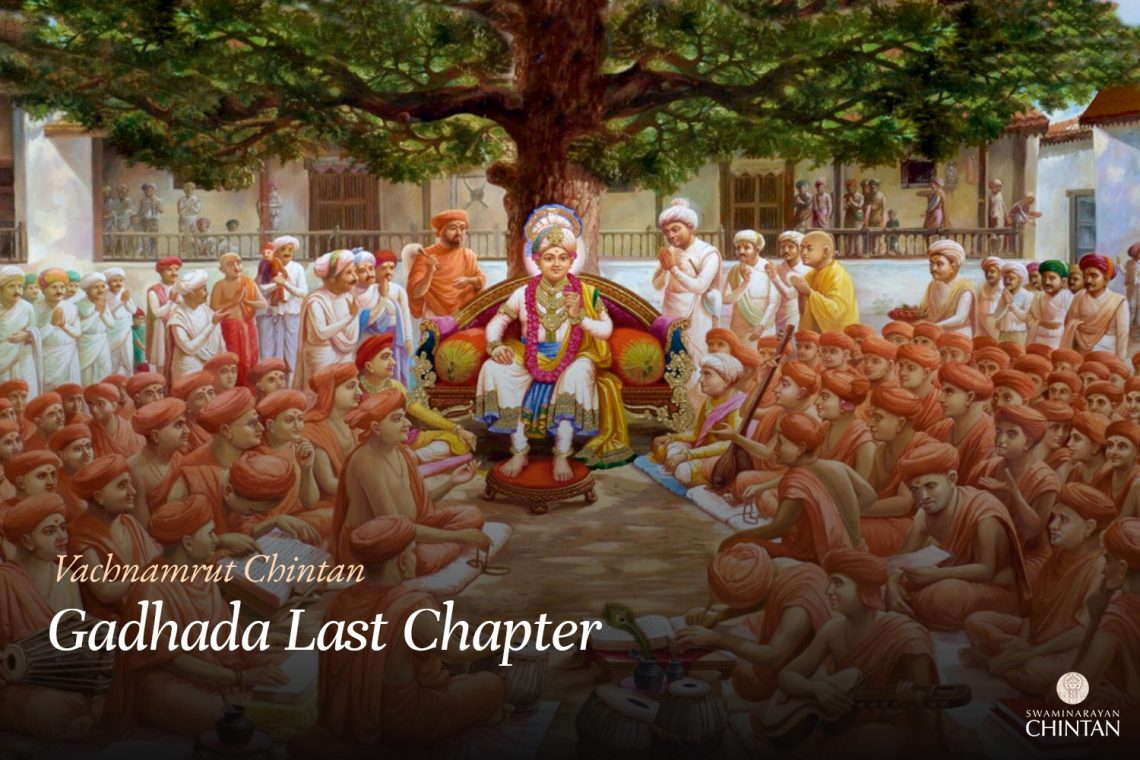Central Insights:
- The reasons for falling from devotion to Bhagwan:
Two causes of a devotee’s downfall in the path of devotion, understanding Bhagwan’s glory, and the joy of a selfless devotee in Bhagwan’s bliss.
Key Points:
- Understand Bhagwan’s greatness but not as Nirakar (formless).
- Realize Bhagwan as Sakar (with form), but divine, not like a human.
- When one knows Bhagwan’s greatness, pride does not arise.
- Bhagwan is extremely pleased with Nishkam Bhakti (selfless devotion).
- Without firmly negating attachments to other objects, one cannot experience Bhagwan’s divine bliss.
Explanation:
Maharaj explains that a jiva falls from devotion in two ways. First, by listening to the barren philosophies of Vedant (the philosophy that denies forms) and concluding that Bhagwan is formless. This denial of the eternal divine form of Bhagwan leads to falling from the path of devotion. Second, a devotee may accept Bhagwan as Sakar but imagines Bhagwan’s form to be worldly and human-like. In doing so, they attribute human flaws like lust to Bhagwan’s divine form, driven by their desires. Consequently, they assume that the divine abodes like Golok and Vaikunth are places of material enjoyment. This results in their downfall from devotion, becoming trapped in desires. Thus, a devotee falls from Bhakti in these two ways: one by imagining Bhagwan as formless and the other by viewing Bhagwan’s form as flawed.
To remain on the path of devotion, one must fully understand Bhagwan’s greatness. However, one must not view Bhagwan as formless and instead understand His form to be completely flawless and divine. Such clarity ensures that the devotee remains steadfast in their devotion.
Sura Khachar then asked Maharaj why a devotee who has understood the divinity of Bhagwan and His Sant may still falter.
Maharaj replied that while the devotee may have developed faith in Bhagwan and His Sant, lingering inner faults, such as lust, anger, or pride, remain unresolved. Over time, these suppressed enemies resurface, causing the devotee to falter when Bhagwan or His Sant confront these flaws. For example, if Bhagwan or a Sant tries to eradicate such faults, the devotee may feel disheartened and turn away. Therefore, if the initial conviction is accompanied by self-reflection and the removal of vices, then such a devotee will not falter later.
Maharaj emphasizes that one should introspect deeply and identify these weaknesses. If addressed sincerely, external criticism or challenges in Satsang will not dishearten them, and their connection with Bhagwan and His Sant will remain unbroken.
Maharaj then posed a question to Brahmanand Swami, Shukmuni, and Sura Khachar:
“What faults in you might cause you to fall from this path?”
They replied, “Maharaj, our flaw is pride. If an equal Sant insults us, we feel troubled.”
Maharaj responded with a teaching: Those who understand Bhagwan’s infinite greatness do not feel pride or jealousy. As the
Vedas state:
द्युुपतय एव ते न ययुरन्तमनन्ततया
dyupataya eva te na yayur antam anantatayā
Even celestial beings like Brahma cannot comprehend Your greatness fully.
Maharaj explained, just as a great king respects the commands of the governor’s servant, those who understand Bhagwan’s supreme authority will not feel pride before His Sant. For instance, Uddhavji, despite his wisdom, sought to be born as a creeper in Vraj, desiring the dust from the feet of the Gopis. Similarly, Brahmaji said:
आसामहो चरण रेणु जुषामहंं स्यांं…
āsāṁ aho caraṇareṇu-juṣām ahaṁ syāṁ
अहो भाग्यमहो भाग्यं नन्दगोपवृजौक्साम
यन्मित्रं परमानन्दं पूर्णं ब्रह्म सनातनम्
aho bhāgyam aho bhāgyaṁ nandagopa-vṛjaukṣām
yan mitraṁ paramānandaṁ pūrṇaṁ brahma sanātanam
How fortunate are the residents of Nandgram, for they have
Bhagwan as their companion.
This understanding eliminates pride and jealousy. A devotee with such awareness becomes the servant of Bhagwan’s servants, tolerating insults and remaining steadfast in Satsang.
Maharaj also emphasized that Bhagwan is immensely pleased with Nishkam Bhakti. He gave the example of a selfless devotee who, even when subjected to suffering such as being hanged, does not pray to Bhagwan to remove the pain. Such a devotee bears their hardships as prarabdha (destined consequences) and remains steadfast in their Bhakti. Bhagwan is extremely pleased with such unwavering devotion.
Maharaj concluded by explaining who experiences Bhagwan’s bliss:
A devotee whose life depends on worldly pleasures, like the Panch Vishay (sensory objects), cannot perceive the bliss of Bhagwan. Just as a fish dies outside water, a person whose happiness is rooted in sensory pleasures is devoid of spiritual consciousness. However, one who renounces attachments to the Panch Vishay and practices Bhakti with singular focus experiences Bhagwan’s divine, unparalleled bliss.
Without renouncing sensory attachments, true realization of Bhagwan’s form and bliss is impossible. Even rigorous practice without detachment will not lead to divine bliss. Only when the heart firmly negates all desires apart from Bhagwan does the divine form of Bhagwan reveal itself in its true glory.
Glossary
| Sakar – With form Referring to God or the divine in a form that can be perceived by the senses, as opposed to the formless (Nirakar) aspect. |
| Nirakar – Formless The state or form where God or a divine entity is perceived as without form or attributes, often contrasting with the manifest form. |
| Nishkam Bhakti – Selfless devotion |
| Panch Vishay – Five sensory objects The worldly temptations related to sight, sound, smell, taste, and touch. |
| Prarabdha – Destined consequences |
| Bhagwan’s Bliss – Divine happiness |
| Vedant – The end of the Vedas A school of philosophy based on the teachings of the Vedas, emphasizing the realization of the supreme reality (Brahman) and the unity of the soul with it. |

